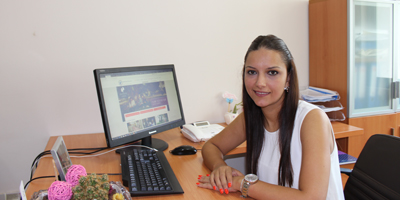EUL Faculty Member Perçinci gave advice to avoid osteoporosis

Head of Department of Nutrition and Dietetics, European University of Lefke (EUL) Health Sciences Faculty Assist. Assoc. Dr. Nasal Bardak Perçinci gave nutritional advice to avoid osteoporosis.
Stating that osteoporosis is defined as a disease in which the bones become perforated and weak and the risk of fracture increases as a result of increased calcium loss from the bones, Perçinci said, “At the same time, bone density and quality decrease, the risk of fracture in the spine, wrist, hip and upper arm increases due to the weakening of the skeletal system, “The increase in treatment, cost and mortality rates due to fractures caused, resulting in economic and labor losses, disrupts the functional status of the patient and reduces the quality of life”
Perçinci listed who is seen more frequently as follows; Women who are over 1.50 years old, who have entered menopause, Those who enter early menopause or who have a surgical menopause after the ovaries are removed by surgery, Those who are fed with low calcium foods, who have vitamin D and C deficiency, Those who do not exercise, Those who consume a lot of cigarettes, alcohol and caffeine foods, Those who have a family member with osteoporosis , Body weight below ideal, Slim-built people, Those with some chronic diseases (such as chronic kidney failure), Those who use some drugs for a long time (such as thyroid drugs)
“Since bone is a living tissue, bones and skeleton develop and grow continuously from birth to the end of adolescence, reaching maximum strength in early adulthood or in the 20s. The factors that children and adolescents should adhere to in terms of bone development can be listed as follows, ”said Perçinci, adding that these factors are adequate calcium intake, utilization of sunlight and adequate vitamin D intake appropriate to the age, sufficient protein intake, participation in regular physical activity, and training to avoid smoking.
Perçinci, who gave important advice on nutrition, listed what needs to be done as follows;
* Milk and dairy products are included in the diet as a source of calcium, as well as protein sources. Other calcium-rich foods include green vegetables such as broccoli, kale, spinach, some fish and almonds. In order to prevent osteoporosis and fracture development, a daily calcium intake of 1200 mg is recommended for adults over 50 years of age. This amount should be taken with diet as much as possible, if not, calcium supplements should be given.
* Vitamin D also plays an important role in bone health, calcium absorption, muscle strength, balance and falling risk. Recommended daily dose of vitamin D for adults over 50 years old is 800-1000 IU. Since it is not possible to get enough with diet, supportive treatment is recommended.
* Insufficient intake of protein can pose a risk for hip fractures and may play a role in delaying healing in patients with fractures. With insufficient protein intake, a decrease in muscle strength and mass, and an increase in the risk of falls and fractures are observed. 1g / kg protein intake per day is recommended. In addition, it is necessary to avoid smoking and to prevent excessive alcohol intake in preventing osteoporosis.
